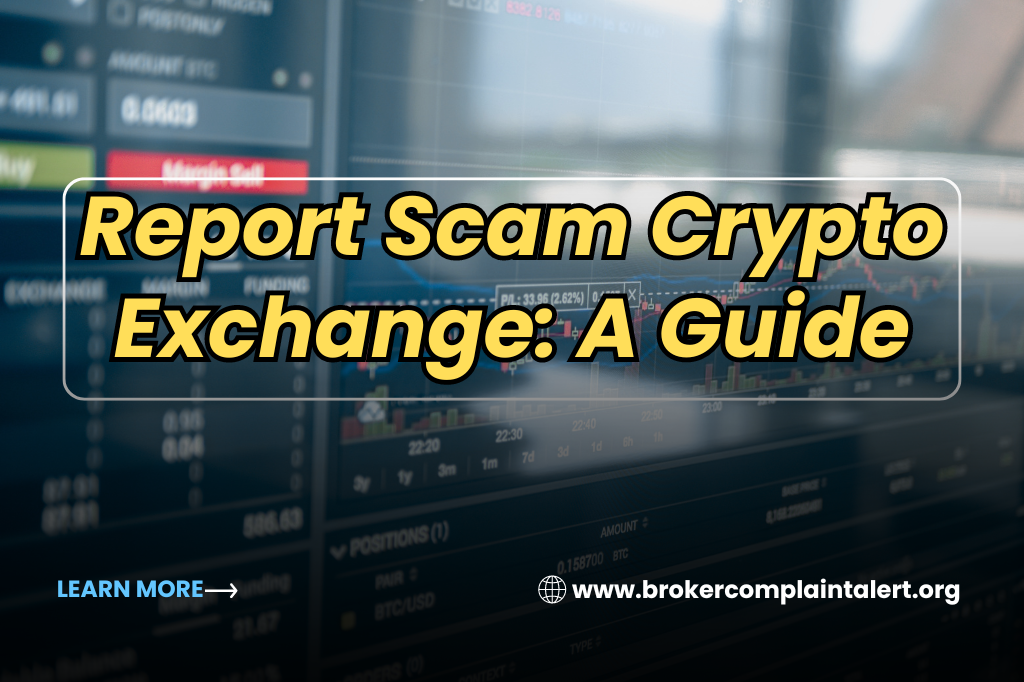As the cryptocurrency market continues to grow, the number of crypto exchanges has surged, offering various platforms for buying, selling, and trading digital assets. While many of these exchanges are legitimate, the rapid expansion of the crypto space has also led to an increase in scams. Scam crypto exchanges deceive users by exploiting the lack of regulation and oversight in the industry. Victims can lose significant amounts of money if they are not cautious. This guide will walk you through the process of identifying, reporting, and dealing with scam crypto exchanges, and highlight how Broker Complaint Alert can assist you in recovering lost funds.
Identifying a Scam Crypto Exchange
Recognizing scam crypto exchanges is crucial to avoid falling victim to fraud. Here are some key indicators and common tactics used by scammers:
Red Flags of Scam Exchanges
- Lack of Regulation and Licensing: Legitimate crypto exchanges are usually regulated by financial authorities and hold licenses to operate. If an exchange lacks proper regulatory oversight or licensing, it’s a significant red flag. Always verify the exchange’s registration with relevant financial regulatory bodies. For example, in the U.S., you can check if the exchange is registered with the Securities and Exchange Commission (SEC) or the Financial Crimes Enforcement Network (FinCEN).
- Unusual or Unrealistic Promises: Scam exchanges often promise extraordinarily high returns with minimal risk. These promises are typically too good to be true. Be wary of exchanges that advertise guaranteed profits or make bold claims about investment opportunities. Legitimate exchanges do not offer guaranteed returns or high-risk-free investments.
- Poor or Unresponsive Customer Support: A reliable exchange should have a responsive and professional customer support team. If you experience difficulty reaching customer support or receive unhelpful responses, it could indicate a scam. Test their support system by asking detailed questions and assessing their responsiveness and quality of assistance.
Common Scam Tactics
- Phishing Schemes: Phishing scam is a common tactic used by scammers to steal sensitive information such as login credentials and financial details. Scammers may send fraudulent emails or messages pretending to be from a legitimate exchange, directing you to fake websites designed to capture your personal information. Always ensure you are on the official website of the exchange and avoid clicking on suspicious links or downloading attachments from unknown sources.
- Fake Websites and Apps: Some scammers create fake websites and apps that closely mimic legitimate exchanges. These fraudulent platforms trick users into entering their personal information or making deposits, which are then stolen. Verify the authenticity of the website by checking for secure connections (https://) and comparing the site’s URL with the official exchange’s address.
- Ponzi Schemes and Fake ICOs: Ponzi schemes involve using funds from new investors to pay earlier investors, promising high returns with little risk. Fake Initial Coin Offerings (ICOs) lure investors with the promise of a new, high-value cryptocurrency but are designed to steal investment funds. Research thoroughly before investing in any ICO or cryptocurrency project, and avoid investing in projects that lack transparency and detailed information.
If you have lost money to companies like Otcb.live or muskspacex.org; please report it to us on our Report a Scam form.
Steps to Report a Scam Crypto Exchange
If you suspect or have confirmed that you are a victim of a scam crypto exchange, it is crucial to take immediate action. Here’s a step-by-step guide on how to report and handle the situation:
Immediate Actions to Take
- Collect and Document Evidence: Start by gathering all relevant evidence related to the scam. This includes transaction records, communications with the exchange, screenshots of suspicious activities, and any other pertinent information. Proper documentation will support your case when reporting the scam and seeking recovery.
- Contact Your Bank or Financial Institution: Notify your bank or credit card company about the fraudulent transaction. Provide them with all the evidence you have collected. They may be able to reverse the charges or assist you in recovering lost funds. Act quickly, as financial institutions have time limits for reporting fraudulent transactions.
Reporting to Regulatory Authorities
- Financial Regulatory Bodies: Report the scam to financial regulatory authorities in your country. For example, in the U.S., you can report to the Securities and Exchange Commission (SEC), the Commodity Futures Trading Commission (CFTC), or the Financial Crimes Enforcement Network (FinCEN). In the U.K., report to the Financial Conduct Authority (FCA). These agencies can investigate the scam and take legal action against the perpetrators.
- Consumer Protection Agencies: Contact consumer protection agencies such as the Federal Trade Commission (FTC) in the U.S. or Consumer Protection Australia. These agencies offer resources and support for reporting and addressing fraudulent activities. They may also provide guidance on next steps and additional avenues for recourse.
Reporting to the Exchange
- Utilize the Exchange’s Complaint Mechanisms: Many legitimate exchanges have formal processes for handling complaints and disputes. Check the exchange’s website for their complaint procedure and submit a formal report. Ensure you follow up on your complaint to confirm that it is being processed.
- Follow-up: After submitting your complaint, keep track of the status and maintain a record of all communications with the exchange. This will help you stay informed about the progress and ensure that your complaint is addressed.
Working with Cryptocurrency Recovery Services
Cryptocurrency recovery services are specialized firms that assist in tracing and recovering funds lost due to scams. Engaging with these services can enhance your chances of recovering lost assets. Here’s what you need to know:
Overview of Cryptocurrency Recovery Services
- Services Offered: Recovery services typically offer a range of solutions, including tracing stolen funds, negotiating with scammers, and recovering lost assets. These services use advanced tools and techniques to track and reclaim funds that have been fraudulently obtained.
- Choosing the Right Service: When selecting a recovery service, consider factors such as their reputation, success rates, and fees. Look for services with positive reviews and testimonials from previous clients. Be cautious of services that make unrealistic promises or charge high fees upfront.
Warning Signs of Fraudulent Recovery Services
- Upfront Fees: Be wary of recovery services that demand large upfront fees before any work is done. Legitimate services usually operate on a success-based fee structure, where they charge a commission only if they successfully recover your funds.
- Lack of Transparency: Avoid recovery services that are not transparent about their methods or fees. A reputable recovery service should clearly explain its approach, fees, and expected outcomes. Ensure you understand the terms before agreeing to their services.
Broker Complaint Alert: How They Can Help
Broker Complaint Alert is a valuable resource for individuals dealing with scam crypto exchanges. They offer comprehensive support to victims of financial fraud. Here’s how they can assist you:
Overview of Broker Complaint Alert
- Free Consultation: Broker Complaint Alert provides free consultations to victims of scams. This initial consultation helps you understand your options and the best course of action for reporting and recovering lost funds. They assess your situation and offer guidance based on their expertise.
- Recovery Service Recommendations: They recommend reputable recovery services that specialize in tracing and recovering stolen funds. Broker Complaint Alert has a network of vetted professionals with a proven track record of success, ensuring you receive reliable assistance.
- Professional Guidance: Broker Complaint Alert offers expert guidance throughout the recovery process. They help you navigate the complexities of dealing with scams, including reporting to authorities, working with recovery services, and protecting yourself from future fraud.
Educational Resources Provided
- Blogs and Materials: Broker Complaint Alert provides educational blogs and resources to help individuals understand how to protect themselves from scams and navigate the recovery process. These resources offer valuable insights and tips for avoiding fraud and recovering lost funds.
- How to Engage: To get in touch with Broker Complaint Alert, visit their website and use their contact form or hotline. Their team will guide you through the process and provide the support you need based on your specific situation.
Conclusion
Dealing with a scam crypto exchange can be a challenging experience, but taking swift and informed action is crucial for recovering lost funds and preventing further losses. By recognizing the signs of a scam, reporting the incident to the appropriate authorities, and seeking help from professional recovery services, you can enhance your chances of a successful resolution. Utilize resources like Broker Complaint Alert for expert guidance and support in navigating the recovery process. Stay vigilant and protect yourself from future scams to ensure a safe and secure experience in the cryptocurrency market.


